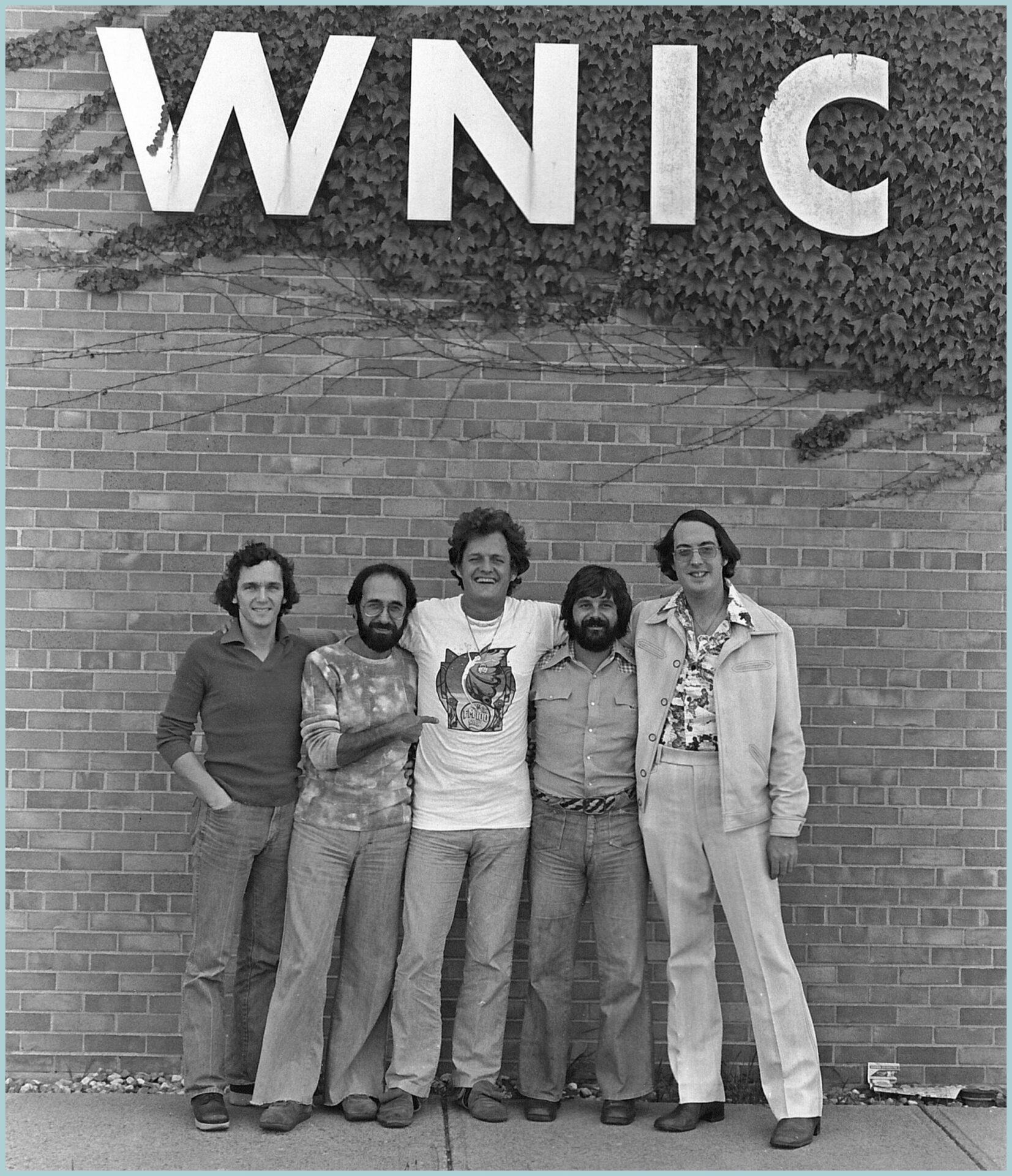
![WNIC-FM [1976] Roy Stephens to the left and Stevie Wonder, then Paul Christie and Steve St John. Stevie was promoting "Isn't She Lovely" at WNIC.](https://mcrfb.com/wp-content/uploads/2023/03/WNIC-Roy-Stephens-PIC-2-MCRFB-2023.jpg)
 A special thank you to former WNIC, WMJC, WOMC, and WCZY personality, Roy Stephens, for recently sharing (on March 3, 2023) his wonderful WNIC radio images and memories with Motor City Radio Flashbacks.
A special thank you to former WNIC, WMJC, WOMC, and WCZY personality, Roy Stephens, for recently sharing (on March 3, 2023) his wonderful WNIC radio images and memories with Motor City Radio Flashbacks.
All featured photos property of Roy Stephens
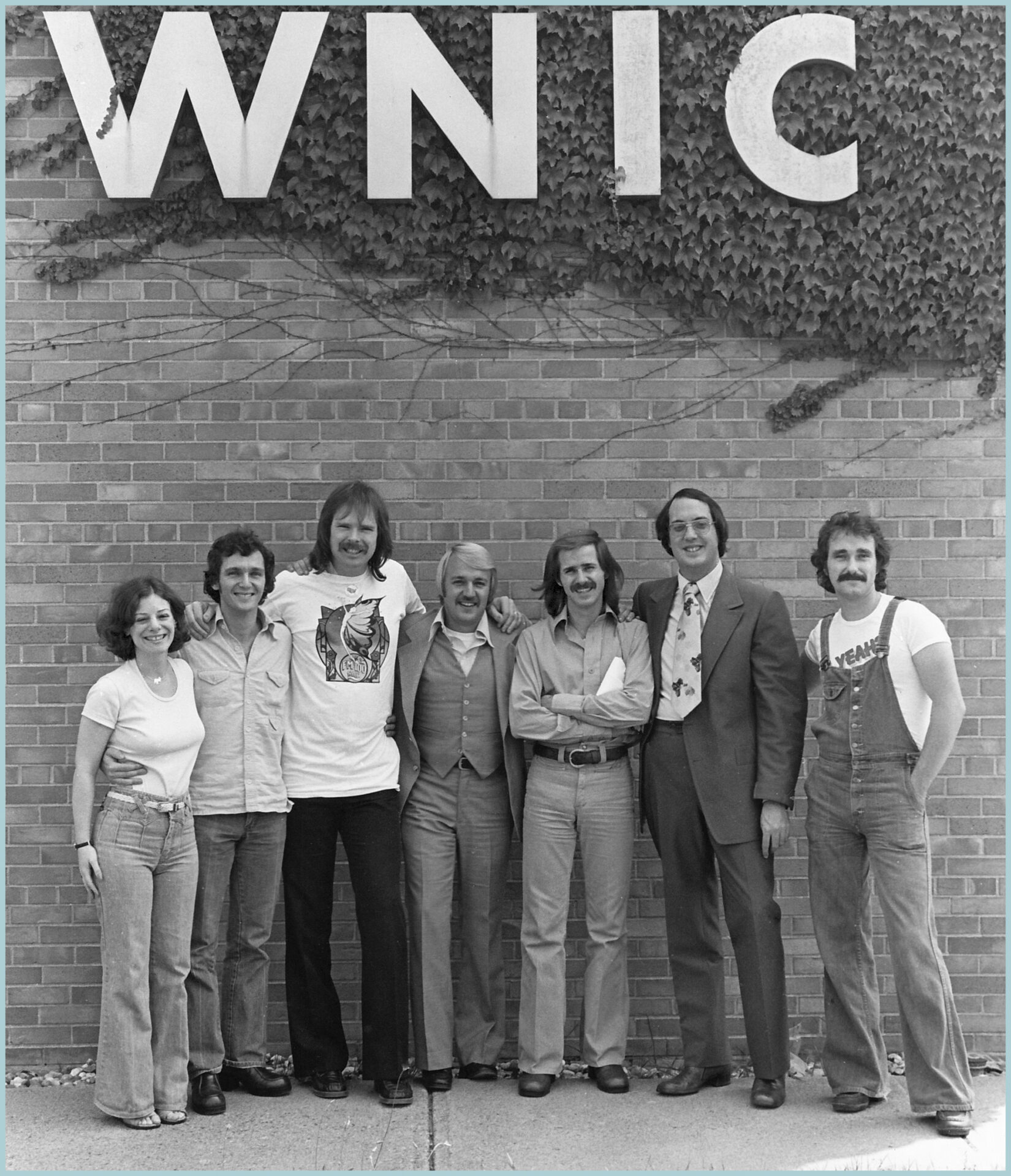
![]()

![WNIC-FM [1976] Roy Stephens to the left and Stevie Wonder, then Paul Christie and Steve St John. Stevie was promoting "Isn't She Lovely" at WNIC.](https://mcrfb.com/wp-content/uploads/2023/03/WNIC-Roy-Stephens-PIC-2-MCRFB-2023.jpg)
 A special thank you to former WNIC, WMJC, WOMC, and WCZY personality, Roy Stephens, for recently sharing (on March 3, 2023) his wonderful WNIC radio images and memories with Motor City Radio Flashbacks.
A special thank you to former WNIC, WMJC, WOMC, and WCZY personality, Roy Stephens, for recently sharing (on March 3, 2023) his wonderful WNIC radio images and memories with Motor City Radio Flashbacks.
All featured photos property of Roy Stephens

![]()
Above article is courtesy freep.com newspaper archive. Copyright 2023. Newspapers.com
The above featured Week’s Top Singles article was clipped, saved, and digitally re-imaged from the credited source by Motor City Radio Flashbacks
_______________
“These are the week’s top 45 rpm singles, as selected by Detroit’s top disc jockeys and the consensus of sales in Detroit and the U.S. as reported by Billboard, international recording news weekly.”
ON YOUR PC? To fully appreciate this Week’s Top Singles for the week of March 4, 1966 chart feature click on image 2x and open to second window. Click image anytime to return to NORMAL image size.
Click your server’s back button to return to MCRFB home page.
ON YOUR MOBILE DEVICE? Tap on chart image. Open to second window. “Stretch” chart across your device screen to magnify for largest print view.


![]()
 MCA, Boston Ventures Close $61 Million Deal
MCA, Boston Ventures Close $61 Million Deal
LOS ANGELES — The sale of Motown Records to the partnership of MCA Records and investment firm Boston Ventures closes the book on Motown’s history as America’s most prominent black -owned independent record company, but the deal has been structured to encourage at least partial minority ownership of the label.
 After weeks of discussion, the purchase was sealed by the principals on June 28. According to Motown executive VP Al Bell, the sale price was $61 million. An informed source says the record label had sales last year of approximately $50 million.
After weeks of discussion, the purchase was sealed by the principals on June 28. According to Motown executive VP Al Bell, the sale price was $61 million. An informed source says the record label had sales last year of approximately $50 million.
Bell confirms that Berry Gordy Jr., founder and chairman of the 30-year old label, “has insisted that 20% equity ownership in the company be made available to minorities.”
The percentage of black ownership could go even higher: Jheryl Busby, MCA executive VP of talent acquisition and president of black music, who is the heir apparent to Motown’s presidency, may receive a 10% equity interest in the label as part of his contract.
Boston Ventures put up 80% of the purchase price, and MCA bought the remaining 20%. Taking into consideration the minority-ownership provision, Bell says, “MCA would end up with 20 %, Boston Ventures with 60%, and the minorities with 20%.”
Under this arrangement, says one source, the future minority shareholders would be able to buy equity from Boston Ventures at the “founder’s share” price – that is, at the per-share acquisition price.
The source adds that the terms of Busby’s stake in Motown are still under discussion; one scenario has part of the stock being given to him outright when he assumes the presidency, with the remainder being withheld as a performance incentive.
Busby’s appointment to the Motown post remains unconfirmed by MCA, which issued only a brief press release on the purchase. MCA Music Group president and chief executive officer Irving Azoff and MCA Records president Myron Roth were unavailable for comment.
However, a source says that an agreement with Busby to take up the Motown reins is “90% done,” and many in the industry – including the outgoing president of Motown Record Corp. – are already discussing his ascendancy to the new post as a fait accompli.
Asked if Busby has been chosen as his successor, outgoing Motown Records president Skip Miller says, `”Being inside, I’d have to say he is. He’s the guy they’ve been talking to. I don’t know if he has a deal yet.”
A Capitol Records source has denied that Step Johnson, Capitol VP and general manager of black music promotion, has discussed the assumption of Busby’s duties with the MCA executive.
It is clear that Motown will be staffed by new executive and managerial personnel.
Miller was to depart Motown July 1, while Bell and Motown Music Group president Lee Young Jr. will sign on with the Gordy Co., Gordy’s diversified entertainment firm.
Motown spokesman Mike Roskind confirms that the company is laying off employees in the wake of the sale. Saying that the size of the staff is “still in a state of transition,” he characterizes the staff cuts as “nothing extreme and nothing conservative.”
A source at Motown says that VP of marketing Miller London and VP of R&B promotion Ronnie Jones will be among a small number of current staff members to be retained in the coming weeks.
“We have placed a great deal of our staff with MCA,” Miller says.
The Motown purchase involves only a part of the large entertainment conglomerate built by Gordy.
Under the terms of the agreement, MCA and Boston Ventures will purchase Motown’s trademarks, its existing contracts (including those of Lionel Richie and Stevie Wonder, the latter of whom agreed to continue with the label just before the sale), and its formidable catalog.
Not included in the sale is Jobete Music, Motown’s lucrative publishing company; the Hitsville studios; record pressing facilities in Arizona and Tennessee; a tape duplication plant in Michigan; and Motown’s film and television production companies.
Jobete, which some observers estimate is worth as much as $95 million, was reportedly included in the original sales discussions between MCA and Motown in late 1986, but was not a subject of the most recent negotiations.
Roskind says Hitsville will remain under Gordy’s ownership. “I’m not sure how [the pressing plants] will be disposed of,” he adds.
John Burns, executive VP of MCA distributing and manufacturing, says that in addition to handling the distribution of Motown product (an arrangement that began in July 1983), MCA will now manufacture Motown’s product.
“We’re going to use their tape facility for some of their overflow,” Burns says.

The sale of Motown climaxes three decades of glittering success and latter-day decline under Gordy’s leadership. The company, which enjoyed about 30 No. 1 pop hits between 1962 and 1971 (when the label moved its headquarters to Los Angeles), has been unable to develop the kind of major crossover acts it had in the heyday of the Supremes, the Temptations, Marvin Gaye, Stevie Wonder, the Four Tops, Smokey Robinson & the Miracles, and other top acts.
Last year, Motown was fourth on Billboard’s year-end list of top black singles labels and eighth among top black album labels; MCA placed first in both categories.
Ironically, the Motown sale was completed the week that its only recent hit album, Wonder’s platinum “Characters,” fell off the Billboard Top Pop Albums chart.
Observers view the sale of the label with both optimism and regret. “I’m very happy that Motown lives and will go on, because it’s an institution,” says outgoing president Miller.
“The realities say that Motown as a black enterprise has grown to the level of an institution,” says executive VP Bell. “Institutions grow to a point where they outgrow individuals or groups.”
Benny Medina, VP of A &R at Warner Bros. and a former Motown staff producer, says the sale was “a good thing based on the current state of affairs there creatively and economically.
This sale will keep alive a tradition of artistry and preserve those things that Berry Gordy built. Under Busby it won’t go by the wayside, as so many other black institutions have.”
Medina cites “a lack of creative vision” as the reason for Motown’s demise over the last 10 years: “Motown was based on first-rate creativity and the careful development of writers, artists, and producers.”
LeBaron Taylor, VP and general manager of corporate affairs for CBS Records Inc., whose Detroit-based Ric -Tic label was bought by Gordy in 1965, reflects on the sale with highly mixed emotions.
“I’m saddened by the fact that Motown was in the position that Berry had to sell or infuse the company with new capital,” Taylor says. “On the other hand, I understand it.
“Back in Detroit, it was our black company,” he continues. “There was a lot of pride – it was our culture. So we’re saddened by it, naturally.” END
Assistance in preparing this story
was provided by Iry Lichtman and Nelson George in New York.
_______________
Credit source information: Billboard, July 9, 1988


![]()

![]()

![]()
Above article/advertisement courtesy freep.com newspaper archive. Copyright 2023. Newspapers.com
The above featured Detroit Free Press article was digitally re-imaged by Motor City Radio Flashbacks
_______________
Missed any of our previous ‘Detroit Radio Back-Pages‘ features? GO HERE

![]()

MCRFB Note: Special THANKS to our friend, John Bartony (a.k.a. Jukebox John) St. Clair Shores, Michigan, for providing the above Detroit Free Press WXYZ 1270 ad (January 30, 1957) for this site, featured today.
A special thank you to senior MCRFB consultant Greg Innis, of Livonia, MI., for contributing the Newspapers.com archives (Detroit radio related) articles, ads, and images we have featured on this site since 2016.
Thank you, Greg Innis, for making these historic Detroit radio features possible. 🙂
_______________
Missed any of our previous ‘Detroit Radio Back-Pages‘ features? GO HERE

![]()

ON YOUR PC? You can read this entire newsprint article/ad — the fine print — ENLARGED. For a larger detailed view click above image 2x and open to second window. Click image anytime to return to NORMAL image size.
Click your server’s back button to return to MCRFB.COM home page.
ON YOUR MOBILE DEVICE? Tap on newsprint image. Open to second window. “Stretch” image across your device screen to magnify for largest print view.
![]()
The above Billboard 03/06/1976 chart was digitally re-imaged by Motor City Radio Flashbacks

![]()
 ON YOUR MOBILE DEVICE? Tap over featured chart image. Open to second window. “Stretch” across your device screen to magnify for larger print view.
ON YOUR MOBILE DEVICE? Tap over featured chart image. Open to second window. “Stretch” across your device screen to magnify for larger print view.
ON YOUR PC? Click on chart image 2x for largest detailed view.

![]()
 Identified with The Temptations, Ruffin Wants To Be Known ‘As Myself’
Identified with The Temptations, Ruffin Wants To Be Known ‘As Myself’
LOS ANGELES — When David Ruffin left his lead singer slot with the Temptations in 1968 following a string of hits, including six top 10 disks in four years, many considered the move a risky one at best for a man who was in a R&B group that basically never missed the charts.
Yet Ruffin’s first solo effort, “My Whole World Ended,” was also a top 10 hit. He followed with several more chart records over the next few years, before taking a hiatus from the business of pop, R&B.
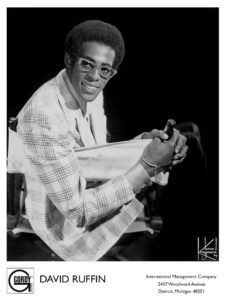 Now, back with a new LP (“Me ‘n’ Rock And Roll Are Here To Stay”) and set to perform again, the man many feel is the most important and most popular R&B vocalist is looking forward to a beginning of a brand new career.
Now, back with a new LP (“Me ‘n’ Rock And Roll Are Here To Stay”) and set to perform again, the man many feel is the most important and most popular R&B vocalist is looking forward to a beginning of a brand new career.
With the Temptations, Ruffin was lead singer for one of the first black groups to break the “soul” category barrier. The hits were universal hits. “We were singing universal songs,” he says today, “produced by good people and written by good people. And the masses were ready for it.
“As for leaving the group, he says, “I had been a solo artist before joining and I wanted to be solo again. There were some conflict and some jealousy within the Temps,but most groups are that way. I’m not taking anything away from my days with the group, because they were some of the most beautiful times I had. Still, in a group you are obligated to give your all to that group. It didn’t bother me to the extent it affected my singing, but it did affect me. So, while it was beautiful to have been lead singer of the Temps for four years, it may have been the most important thing that happened to me when I decided to leave them.”
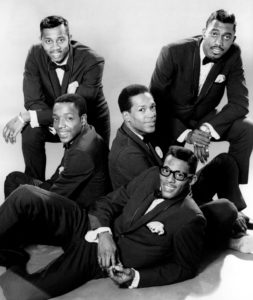 As mentioned, Ruffin’s first effort was a solid hit. Then he began to take things a bit slower. “I wanted to be identified with the Temptations in a way,” he says, “plus I wanted to be known as myself. And you really cannot change your voice.”
As mentioned, Ruffin’s first effort was a solid hit. Then he began to take things a bit slower. “I wanted to be identified with the Temptations in a way,” he says, “plus I wanted to be known as myself. And you really cannot change your voice.”
During this hiatus, Rod Stewart began stating in interviews that Ruffin was the greatest R&B singer he’d ever heard, and cut such Temptations classic as “Losing You,” and “I Wish It Would Rain,” on his LPs. The Rolling Stones recently cut “Ain’t Too Proud To Beg,” and Stewart once called upon Ruffin from the audience to join him on stage.
“I thought the things Rod said were great,” Ruffin says, “because I admire him and also because so few take time to acknowledge others. He used to come to my house when he was in Detroit, and we’ve still got three songs we wrote together.”
Ruffin says his time over the past few years were spent “trying to take a look at myself. I didn’t make much money but I had a lot of fun and I learned a lot by listening and watching. And I think that more than everything else, good rock is now good rock. The barriers between music are breaking, and the black artists has a better overall opportunity.
 “But it’s the rock scene I like. That’s why my LP is called what it is and that’s why there are things we hope will appeal to everyone on it. It’s the most relaxed thing I’ve ever done. I took my time; I took the songs home and I had fun. And I found how to get the most from my voice.
“But it’s the rock scene I like. That’s why my LP is called what it is and that’s why there are things we hope will appeal to everyone on it. It’s the most relaxed thing I’ve ever done. I took my time; I took the songs home and I had fun. And I found how to get the most from my voice.
“Norman Whitfield produced most of it and wrote most of it. And the LP is more planned than anything I’ve ever done and I think that, along with aiming the LP at everyone, it has become a growing trend in black music.”
As for touring, Ruffin opened at the Whisky Au Go-Go here last week with a new band (two guitars, bass, drums, keyboards, alto and tenor saxophones) and will decide on his “road” future after the engagement.
One thing Ruffin will do is one-nighters. “I happen to like them,” he says, “I’m not 24 anymore, but I still like to sing to people, and the more places you go, the more singing you do and more people you meet. And you can always learn.” END
_______________
Credit source information: Billboard, November 16, 1974

![]()
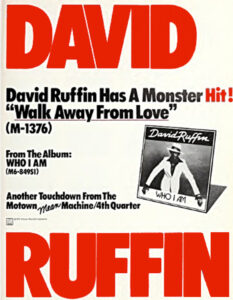 “Walk Away From Love” is a song recorded by American singer David Ruffin in 1975. The million-selling single, produced by Van McCoy and written by Charles Kipps, was number one on the US R&B Singles Chart for one week in early 1976, and crossed over to #9 (2 weeks; January 24, 1976) where it remained 15 weeks overall on the Pop Charts. In Canada, the song peaked at #30.
“Walk Away From Love” is a song recorded by American singer David Ruffin in 1975. The million-selling single, produced by Van McCoy and written by Charles Kipps, was number one on the US R&B Singles Chart for one week in early 1976, and crossed over to #9 (2 weeks; January 24, 1976) where it remained 15 weeks overall on the Pop Charts. In Canada, the song peaked at #30.
“Walk Away from Love” was Ruffin’s only number-one R&B hit, and only one of two Top 10 pop hits for Ruffin on the Billboard Hot 100, the other being “My Whole World Ended (The Moment You Left Me)”, which also peaked at #9. The song was his only solo entry into the UK charts, where it was a top ten hit as well, and peaked at #10 in early 1976. The backing vocals were performed by the disco group Faith, Hope & Charity.
Released November 15 1975, “Walk Away From Love” peaked at #1 (charted 17 total weeks R&B overall) on the Billboard R&B charts in 1975. B-side: “Love Can Be Hazardous To Your Health” MOTOWN 1376F
_______________
Source: Billboard Top R&B Singles; Joel Whitburn Pop Annual; Wikipedia

![]() Audio digitally remastered by Motor City Radio Flashbacks
Audio digitally remastered by Motor City Radio Flashbacks
![]()

This featured WHYT chart was digitally restored by Motor City Radio Flashbacks
ON YOUR PC? To fully appreciate this WHYT February 16, 1987 chart feature click on image 2x and open to second window. Click image anytime to return to NORMAL image size.
Click your server’s back button to return to MCRFB home page.
ON YOUR MOBILE DEVICE? Tap on chart image. Open to second window. “Stretch” across the featured survey to magnify largest print view.
A sincere thank you Mrs. Patti Griggs. This featured presentation would have not been possible without your generosity, dedication, and your continuous support.
Above WHYT music chart courtesy of Mrs. Patti Griggs and the George L. Griggs estate.

![]()